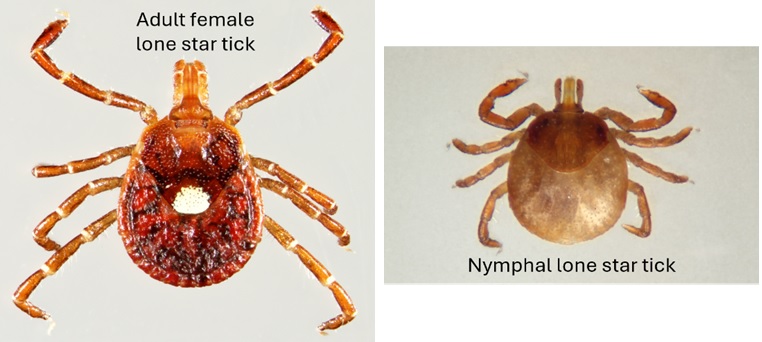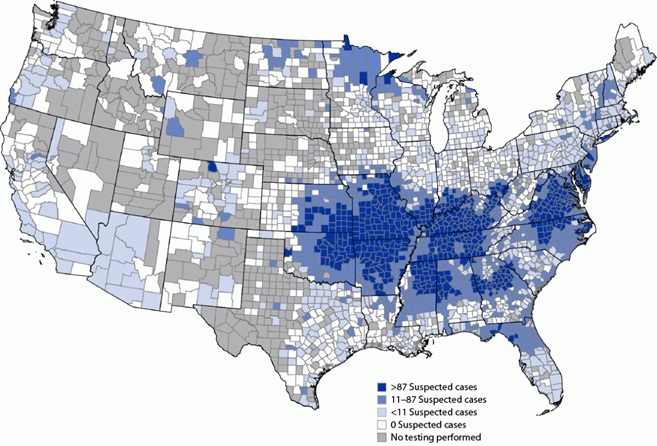Life with Alpha-Gal Red Meat Allergy
ENTFACT-656: Life with Alpha-Gal Red Meat Allergy | Download PDF
BY Heather Norman-Burgdolf, Extension Specialist for Food and Nutrition
and Jonathan L. Larson, Extension Specialist for Entomology
UNIVERSITY OF KENTUCKY COLLEGE OF AGRICULTURE
Fast Facts
- Alpha-gal syndrome or red meat allergy is an allergic condition. Those with the condition must forgo eating beef, lamb, pork, and wild game. Sufferers can still eat poultry, seafood, eggs, and plant-based sources of protein.
- Symptoms can include gastrointestinal issue such as nausea, indigestion, and diarrhea and other allergic symptoms such as cough, hives, shortness of breath, difficulty breathing, and swelling of the eyes/tongue/lips/throat, amongst others.
- Alpha-gal is currently only known to be spread by the lone star tick, which is also the most commonly encountered species of tick in Kentucky.
- Not every lone star tick bite will result in the red meat allergy. Allergic symptoms can appear 3-6 hours after eating red meat and sufferers will need to consult with a physician or allergist for diagnosis and management.
How Do You Get Red Meat Allergy?
Current data suggests that alpha-gal syndrome is spread by bites from lone star ticks. No other tick has been associated with this issue in the state. Lone star ticks feed on other animals, possibly ending up with the alpha-gal sugar molecule in their mouth/saliva. When they feed on a human, they may accidentally “inject” the molecule into the bloodstream.
Humans do not have alpha-gal in our blood. Therefore, when a tick passes it to a person, the body may mount an immune response to this “foreign invader”. Unfortunately, alpha-gal is present in the red meat humans eat (even after cooking) and if the body encounters alpha-gal in the stomach after development of alpha-gal syndrome, it may engage the same immune response.
Not every bite from a lone star tick will result in alpha-gal syndrome. This could be due to the tick or to the immune response of the person who was bitten. It is more likely that red meat allergy is associated with adult and nymphal ticks than with larval ticks (aka seed ticks).

What Symptoms Might You Notice?
As with other allergic reactions, alpha-gal syndrome can cause symptoms such as skin irritations, hives, gut issues, and breathing problems. The severity of the condition is different for everyone. Unlike the typical food allergy, a person with alpha-gal syndrome may have a delayed allergic reaction anywhere between three and six hours after ingesting meat or other products that come from mammals. This may make it difficult to diagnose.
What Lifestyle Changes Will Be Made?
There is no known treatment for alpha-gal syndrome. Instead, lifestyle changes can be made that help manage and reduce the symptoms. People who have alpha gal must remove beef, pork, and lamb from their diets to avoid allergic reactions. Certain cuts and types of meat have higher amounts of alpha-gal and cause worse reactions. For example, organ meats such as liver, heart, and tripe have higher amounts of alpha-gal.
Other foods often made with ingredients from mammals that may cause reactions include broths, bouillon, stocks, gravy, and other items made with lard or tallow. For those who hunt, be mindful that wild game is also a source of alpha-gal. This includes everything from venison to squirrel.
Several food additives that utilize ingredients from animals may also cause a reaction. These include gelatin, glycerin, magnesium stearate, and bovine extract. As a result, those with alpha-gal syndrome should consider checking the ingredient labels when purchasing products like these.
Some prescribed medications and medical treatments may also cause a reaction. These may include heparin, antivenoms, certain chemotherapy drugs, and even heart valves derived from pigs or cows. Always ask if the prescribed medication or suggested treatment causes a reaction for those living with alpha-gal.
Depending on the severity of the condition, some people may still be able to have dairy. Those with a more serious form of alpha-gal may not be able to tolerate dairy at all.
The symptoms of alpha-gal may decrease over time, particularly if further bites from lone star ticks are prevented. In some cases this has taken 1-2 years. More bites from ticks carrying alpha-gal though could extend the window of symptoms.
What Sources of Protein Are Left?
Those living with alpha-gal may have concerns about getting enough protein in their diet. Luckily, there are high-protein foods that do not contain alpha-gal. These foods include:
• Poultry (chicken, turkey, duck, or quail)
• Seafood (fish, shellfish)
• Eggs
• Beans
• Nuts and seeds
Other foods like grains, vegetables, and fruits should still be consumed. As individuals with alpha-gal tend to have different tolerance levels to meat products, dairy, and other animal byproducts, individuals should work with a health care provider, such as a registered dietitian, to find a diet that works for them and meets their personal nutrition needs.

Kentucky and Alpha-gal and Prevention
While still considered “rare” relative to other medical issues in the state, Kentucky is one of the states with the most cases of alpha-gal in the US, according to the CDC.
Wearing repellents while outdoors, such as DEET, picaridin, and oil of lemon eucalyptus can help prevent tick bites. So too can permethrin applied to clothing. Lone star ticks are active as adults and nymphs from March-August and can be found nearly anywhere that is overgrown and weedy as well as along paths.
To learn more about lone star ticks, please read:
https://entomology.ca.uky.edu/ef648
05/24 (Issued)
